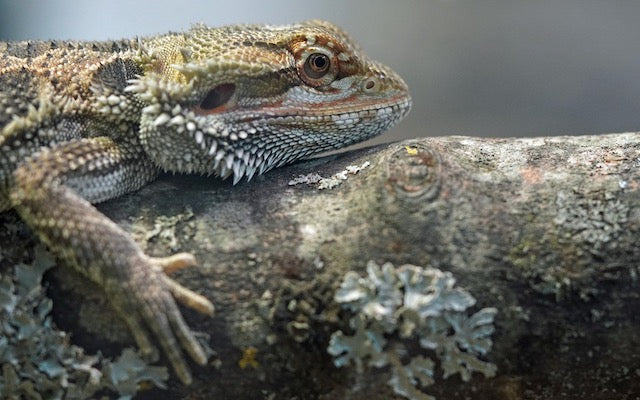If you’ve been thinking about getting a bearded dragon, you might be shocked to find out that they are actually venomous. It’s true! But does this mean they are dangerous? Are you doomed if you’re bitten?
Are Bearded Dragons Venomous?
Here’s the short answer: Yes, bearded dragons are venomous. Don’t worry though. They only have a mild venom, and it’s not really harmful to humans.
Generally salmonella is a bigger concern than venom or bites, and even that risk is mitigated if you wash your hands thoroughly before and after handling your dragon, disinfect anything they poo on, and take basic precautions such as not bathing your dragon in the same sink or tub you use.
For all you science lovers out there, here are some fun facts about bearded dragon venom:
- Venom was discovered among snakes and a group of lizards sharing the same lineage. These lizards include Komodo dragons, bearded dragons, Gila monsters, and iguanas.
- The venom produced by bearded dragons contains the same substance found in rattlesnake venom. This substance is called crotamine.
- Bearded dragons’ venom is made of smaller molecules than snake venom, which means an allergic reaction is less likely if you are bitten.
Note: We found these fun facts in a 2005 New York Times article which discusses venom research and discoveries made by Dr. Brian Fry (aka “The Venom Doc”) and a team of herpetologists.
Are Bearded Dragons Poisonous?
On a related note, are bearded dragons poisonous? The answer is no.
Bearded dragons only secrete venom, not poison.
Poison is actually different from venom, even though some people use the terms synonymously in everyday conversation. They are both toxins, but here’s the difference:
Poison is a toxin that gets into the body via swallowing, inhaling or absorption through the skin. … Venom is a specialised type of poison that has evolved for a specific purpose. It is actively injected via a bite or sting. Because venom has a mixture of small and large molecules, it needs a wound to be able to enter the body, and to be effective must find its way into the bloodstream. (Source: Australian Academy of Science)
So, to sum up, poison and venom enter the body in a different way, and venom has to enter the bloodstream to work.
Are Bearded Dragons Dangerous?
When you learn that bearded dragons are venomous, it’s only natural to start wondering if they are actually safe to have as pets. Rest assured, they are! Bearded dragons really aren’t dangerous if they are properly cared for.
Bearded dragons need a healthy diet, a terrarium setup that mirrors their natural habitat, regular baths, and regular exercise and playtime. Give them these things and lots of love, and they’ll be happy campers.
Now, that being said, it’s always important to know your dragon’s regular behaviors so you know when something is off. It’s normal for pets to get stressed from time to time. But signs of stress and various behaviors that may be out of the ordinary can let you know when something might be wrong, and bearded dragons may bite when agitated. Be aware of your dragon's behaviors and signs, and avoid picking them up until they are calm.

What Does Bearded Dragon Venom Do?
At this point you might be wondering, why do bearded dragons have venom? What does it do?
Bearded dragon venom immobilizes prey by knocking it out. The venom is secreted from glands in the bearded dragon's mouth, allowing them to chomp without as much resistance. It's interesting to note that the venom doesn't even kill the prey. It's much more mild than rattlesnake venom, despite containing the same substance. (Source: New York Times article)
Bearded Dragon Bites
Given the fact that bearded dragon venom is mild, what happens if a bearded dragon bites you? Here are the most important things you should know:
- Dragons rarely bite. When they do, it’s rarely serious.
- A dragon bite may be painful because their teeth are sharp.
- If you are bitten, the site may swell and bleed.
- Salmonella could be an issue. It’s important to clean the wound and apply antibiotic ointment and a bandage. Call your doctor if the wound looks infected. You should also make sure you are up to date on your tetanus shot.
- Venom won’t hurt humans unless there is an allergic reaction. Seek immediate medical attention if you have any signs of an allergic reaction after being bitten.
Pro Tip: If your bearded dragon bites another pet (especially a small one), call your vet immediately, as the venom may cause harm.
How to Prevent a Bearded Dragon Bite
Bearded dragon bites are fairly easy to prevent. There are three main things you can do, in addition to keeping them as happy and healthy as you can:
- Know your dragon. Look for and know the signs of stress and aggression, such as their beard turning black and puffing out. If your bearded dragon is agitated, you should wait until they calm down to try and handle them. If you absolutely must handle them—for example, perhaps you have to take them to the vet—you may want to wear thick protective gloves when you pick them up.
- Don't mishandle them. Make sure you handle your dragon properly. Place your hand under their belly, support their legs, and lift them gently. Don’t approach them directly from above, as they will think you’re a predator. If you have children who will be handling your dragon, make sure they understand how to do it properly and gently.
- Don't feed by hand. Feeding your dragon by hand can cause a bite, since your dragon may be really eager to eat. Use tweezers or a food dish instead.
Takeaway: Bearded dragons produce a mild venom in their mouth that helps immobilize their prey. This venom is not dangerous to humans unless an allergic reaction occurs. Dragon bites are rare, and there are simple ways to avoid being bitten.
Sources & Further Reading:
https://www.nytimes.com/2005/11/22/science/clues-to-the-origin-of-snake-venom.html
https://www.science.org.au/curious/people-medicine/poison-vs-venom/
If you have questions or would like to give feedback, please email us at team@dragonsdiet.com








